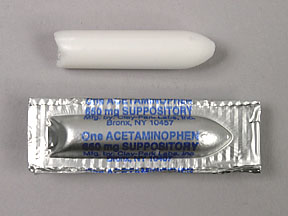
Acetaminophen Coupons & Savings Card – Discount Prices from $3.18
Generic for: Apap childrens, Apap extra strength, Aminofen
My prescription
Edit
650MG, Acetaminophen (3 Suppositories)
Select pharmacy

Walgreens
$3.18
COUPON PRICE
Albertsons
$5.05
COUPON PRICE
Walmart
$11.60
COUPON PRICEAcetaminophen savings card
Show this card to your pharmacist
Walgreens
$3.18
BIN
ID
PCN
GRP
015995
LHKPX275986
GDC
DR33
Powered by
More prescriptions for pain
More prescriptions for pain
Price history for Pain Reliever (brand) & Acetaminophen (generic)
3 Suppositories, 650MG
Average retail price for Pain Reliever
Average retail price for Acetaminophen
Average SaveHealth price for Acetaminophen
Our price history data is based on aggregated prescription data collected from participating pharmacies in America. Our prescription data updates daily to reflect the latest price changes. If you notice a missing data point, it means there wasn't sufficient data available to generate a monetary value for that date.
We analyzed Acetaminophen prices for (650MG, 3 Suppositories) over the last 12 months. The average retail price was $45.63, while the average price using the SaveHealth discount card was $6.45. That's a savings of approximately 85.86% when using our Acetaminophen coupon.
Compared to the generic version, Pain Reliever had an average price of $2.40 over the same time period. With the SaveHealth savings card, Acetaminophen is -168.75% cheaper on average than Pain Reliever.
*Retail prices are based on pharmacy claims data, and may not be accurate when we don't have enough claims.
Acetaminophen Extra Strength (Acetaminophen) dosage forms
Dosage Quantity Price from Per unit 120MG 1 Suppository $9.22 $9.22 120MG 12 Suppositories $11.63 $0.97 120MG 100 Suppositories $30.90 $0.31 650MG 3 Suppositories $9.99 $3.33 650MG 12 Suppositories $12.96 $1.08 650MG 50 Suppositories $25.50 $0.51 650MG 100 Suppositories $42.00 $0.42
| Dosage | Quantity | Price from | Per unit |
|---|---|---|---|
| 120MG | 1 Suppository | $9.22 | $9.22 |
| 120MG | 12 Suppositories | $11.63 | $0.97 |
| 120MG | 100 Suppositories | $30.90 | $0.31 |
| 650MG | 3 Suppositories | $9.99 | $3.33 |
| 650MG | 12 Suppositories | $12.96 | $1.08 |
| 650MG | 50 Suppositories | $25.50 | $0.51 |
| 650MG | 100 Suppositories | $42.00 | $0.42 |
